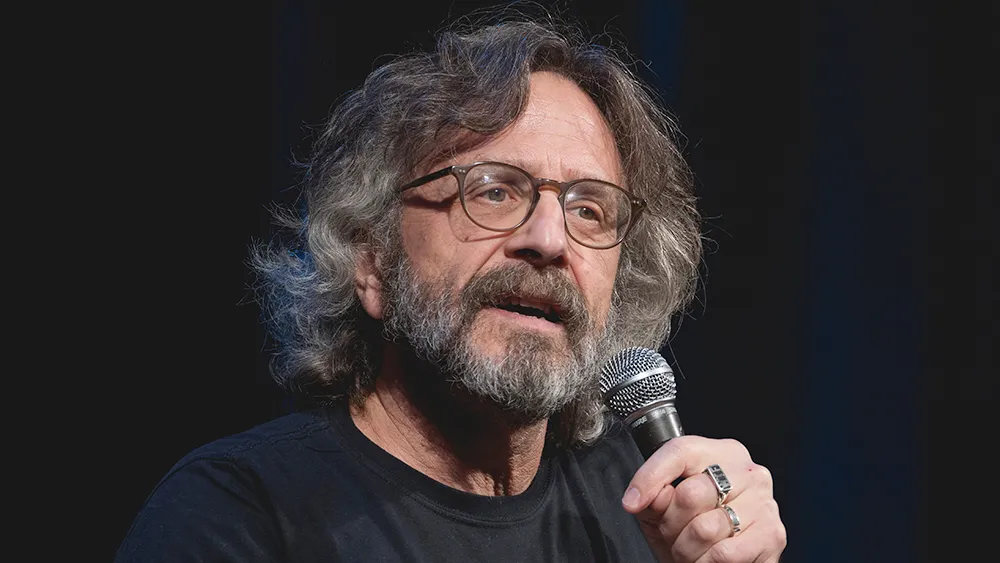In a heated exchange on the latest episode of the WTF podcast, Marc Maron took Bill Maher to task for expressing agreement with some of Donald Trump’s policies, igniting a fierce debate on the role of public figures in supporting controversial movements. Maron, never one to shy away from speaking his mind, didn’t hold back in calling Maher out for aligning himself with certain aspects of the former president’s agenda. But this confrontation was just the latest chapter in Maron’s vocal condemnation of comedians and podcasters who, in his view, normalize dangerous ideologies.
Maron’s Critique of Maher’s Trump Support
During a candid moment with guest W. Kamau Bell, Marc Maron didn’t mince words when addressing Bill Maher’s recent statements. Maher had expressed some level of agreement with certain actions taken by Donald Trump during his second term, and Maron, visibly irritated, blasted him for it. “Are you going to be like Bill Maher, you know, ‘I’m going to agree with some of the things that Trump is doing,’” Maron remarked. “It’s like, dude, you’re a bitch.”
Maron’s frustration stemmed not just from Maher’s comments, but from his perceived tendency to find common ground with members of the MAGA coalition. Imitating Maher, Maron mocked his attempts to rationalize connections with controversial figures, adding, “I like Kid Rock. And now you’re gonna blow him with a slightly disdainful look on your face? That’s who you are?” This direct criticism underscored Maron’s growing impatience with those who, in his view, were legitimizing right-wing figures through casual associations.
The clash between Maron and Maher reveals a deeper rift in the world of comedy and politics—one where public figures are increasingly being scrutinized for the political stances they take, especially when those stances align with divisive figures like Trump. Maron’s unfiltered comments highlight his belief that such positions undermine the cultural and political progress many hope to see in the country.
Maron’s Larger Concerns About Comedy and Politics
Maron’s criticism of Maher fits into a larger narrative he’s been crafting for years about the intersection of comedy, politics, and the normalization of extreme ideologies. The comedian has been outspoken in his condemnation of fellow podcasters and comedians who, in his eyes, provide platforms to right-wing extremists and even self-proclaimed white supremacists. Maron has previously argued that such actions serve to “humanize and normalize fascism,” a sentiment he reiterated on the WTF podcast.
Before the 2020 election, Maron took to his blog to call out comedians who “joke around” with right-wing figures like Joe Rogan, whose podcast features a wide range of controversial guests, including Trump allies. Maron’s criticism wasn’t just about political affiliation; it was about the cultural impact of these associations. By making light of serious issues and engaging with figures that promote hate and division, Maron believes these comedians are inadvertently feeding into the rise of a dangerous political movement. For Maron, this isn’t just a matter of political disagreement—it’s about the potential erosion of democratic values and the power of comedy to influence public perception.
He has been equally vocal about his fear of a growing “American fascist movement,” which he believes is rooted in a combination of religious grievance, tech influence, and an overwhelming tide of misinformation. In his view, the “anti-woke” movement, which has been championed by many of his peers in the comedy world, is playing a key role in spreading fascism’s message, whether these comedians fully realize the consequences or not. Maron’s criticism paints a grim picture of the role that comedy can play in shaping the political landscape.
The Public Face of a Political Movement
Maron’s remarks also touched on a larger concern: the way in which comedians have become part of the public face of a political movement that he believes seeks to undermine democracy. He argues that whether comedians are aware of it or not, by engaging with certain figures and ideologies, they are helping to legitimize a fascist political agenda. This public endorsement, even if it comes in the form of casual jokes or off-hand comments, can have a profound impact on how these ideas are perceived by the broader public.
He pointed out that the movement driving the anti-woke rhetoric is “driven almost exclusively by comics, my peers.” Maron sees this as a dangerous trend, with comedians taking center stage in a battle that could ultimately reshape the nation’s political future. Whether these comedians are true believers in fascism or simply using the movement for self-serving purposes, Maron argues, they are still complicit in giving voice to ideas that threaten democratic principles. The comedic world, once a space for challenging authority and promoting progressive ideas, has, in Maron’s view, become a platform for dangerous political rhetoric.
This shifting dynamic has raised questions about the role of comedy in the current political climate. Are comedians responsible for shaping public opinion in ways that go beyond entertainment? As Maron’s criticism shows, the impact of comedy on political discourse is becoming increasingly complex, with comedians like him taking a stand against the normalization of extreme views. Maron’s stance is a call to action for those in the industry to think critically about the content they create and the messages they amplify.
Maron’s outburst at Maher represents more than just a personal critique; it’s a reflection of a larger ideological struggle within the entertainment world. As political divisions continue to deepen, the role of comedians in navigating these turbulent waters will only become more crucial. Whether they choose to embrace or challenge the political movements shaping the future of America will have lasting consequences—not just for the political landscape, but for the cultural one as well.
